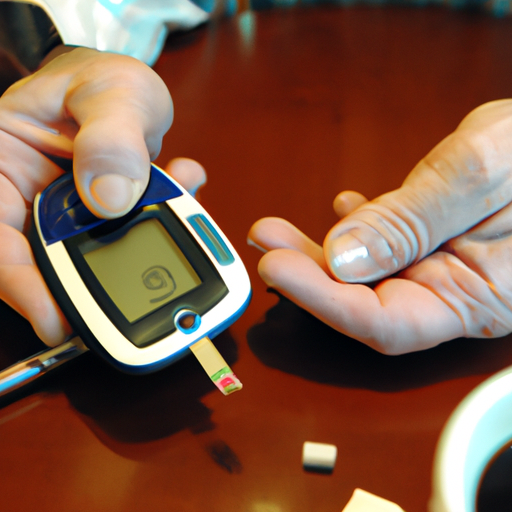
Living With Diabetes: Four Tips To Get You Started is the ultimate guide for anyone who has recently been diagnosed with diabetes or who wants to learn more about managing the condition. This comprehensive article provides an assortment of practical tips and strategies to help you navigate the challenges of living with diabetes. From creating a personalized meal plan to staying physically active, this article offers valuable insights to empower you on your journey towards a healthier and happier life with diabetes. So, let’s get started and discover the key to living well with this chronic condition.
Healthy Eating
Choose a Balanced Diet
When it comes to managing your diabetes, one of the most important things you can do is to eat a balanced diet. This means including a variety of foods from all food groups in your meals. Aim to include carbohydrates, proteins, and healthy fats in each meal. Carbohydrates, like fruits, vegetables, and whole grains, should make up about half of your plate. Proteins, such as lean meats, poultry, fish, beans, and tofu, should make up about a quarter of your plate. And don’t forget about healthy fats like avocados, nuts, and olive oil, which should make up the remaining quarter of your plate.
Control Portion Sizes
Another key aspect of healthy eating with diabetes is controlling portion sizes. It’s important to be mindful of how much you’re eating to help regulate your blood sugar levels. Even if you’re eating healthy foods, consuming large portions can still lead to high blood sugar levels. Consider using smaller plates or bowls to help with portion control. Be conscious of serving sizes listed on nutrition labels and try to avoid eating out of oversized packages. It may also be helpful to measure your food with measuring cups or a food scale until you become more familiar with appropriate portion sizes.
Monitor Carbohydrate Intake
Monitoring your carbohydrate intake is especially important for managing diabetes. Carbohydrates have the most significant impact on your blood sugar levels, so it’s crucial to pay attention to the amount and type of carbs you eat. Focus on consuming complex carbohydrates, such as whole grains, fruits, and vegetables, as they provide sustained energy and have a lower impact on blood sugar levels compared to refined carbohydrates. Consider working with a registered dietitian to help you develop a meal plan that suits your individual needs and helps you manage your blood sugar levels more effectively.
Regular Exercise
Importance of Physical Activity
In addition to maintaining a healthy diet, regular exercise is a critical component of managing diabetes. Physical activity not only helps to improve blood sugar control, but it also offers a range of other health benefits. Exercise can help you maintain a healthy weight, reduce your risk of heart disease, improve your mood, and increase your overall energy levels. Regular physical activity also helps your body use insulin more effectively, which is essential for managing diabetes.
Types of Exercises
There are several types of exercises you can incorporate into your routine to help manage your diabetes. Aerobic exercises, such as brisk walking, swimming, dancing, or cycling, can help lower your blood sugar levels and improve your cardiovascular health. Strength training exercises, like weightlifting or resistance band exercises, can increase your muscle strength and improve insulin sensitivity. Flexibility exercises, such as yoga or tai chi, can enhance your balance, flexibility, and overall well-being. Aim for a combination of aerobic, strength training, and flexibility exercises to reap the most benefits.
Creating an Exercise Routine
To make exercise a regular part of your life, it’s important to create a routine that works for you. Start by setting realistic goals and gradually increase your activity level. Aim for at least 150 minutes of moderate-intensity aerobic exercise per week, spread out over at least three days. Incorporate strength training exercises two to three times a week, targeting all major muscle groups. Find activities that you enjoy, as this will make it easier to stick with your routine. Remember to consult with your healthcare team before starting a new exercise program, especially if you have any existing health conditions.

This image is property of images.unsplash.com.
Blood Glucose Monitoring
Understanding Blood Glucose Levels
To effectively manage your diabetes, it’s essential to understand your blood glucose levels. Blood glucose, also known as blood sugar, is a measurement of the amount of sugar (glucose) in your bloodstream. Monitoring your blood glucose levels helps you make informed decisions about your diet, exercise, and medication. Normal blood glucose levels typically range between 70-130 milligrams per deciliter (mg/dL) before meals and less than 180 mg/dL two hours after meals. However, target ranges can vary depending on individual factors, so it’s important to consult with your healthcare team to determine your specific blood glucose targets.
Testing Tools and Techniques
There are various tools available to help monitor your blood glucose levels. One common method is using a blood glucose meter. This device allows you to check your blood sugar levels by pricking your finger and placing a small drop of blood on a test strip. Another option is a continuous glucose monitor (CGM), which measures your glucose levels continuously throughout the day, providing real-time data and trends. With a CGM, you can see how your blood sugar levels change in response to food, exercise, and medication. Speak with your healthcare team to determine which monitoring method is best for you.
Recording and Analyzing Data
Once you start monitoring your blood glucose levels, it’s important to keep track of the data. Recording your blood sugar readings, along with other important factors like food intake, exercise, medication dosages, and how you’re feeling, can help you identify patterns and make necessary adjustments to your diabetes management plan. You can use a simple notebook or a smartphone app to record your data. Some blood glucose meters and CGMs also have built-in tracking features. By analyzing your data, you’ll be able to gain insights into how various factors impact your blood sugar levels and make informed decisions to maintain optimal control.
Managing Medications
Importance of Medication Adherence
For many individuals with diabetes, medication is an essential part of their treatment plan. It’s important to understand the importance of adhering to your medication schedule as prescribed by your healthcare professional. Consistently taking your medications at the proper dosage and time is crucial for maintaining stable blood sugar levels and preventing complications. If you have any concerns or questions about your medications, be sure to discuss them with your healthcare team.
Working with Healthcare Professionals
Managing diabetes often involves working closely with a team of healthcare professionals, including doctors, nurses, dietitians, and diabetes educators. These professionals can provide you with valuable guidance and support as you navigate your diabetes journey. They can help you understand your medications, develop a personalized meal plan, and learn how to monitor and manage your blood sugar levels effectively. Regularly scheduled appointments with your healthcare team allow for ongoing assessment, adjustment, and optimization of your diabetes treatment plan.
Potential Side Effects and Precautions
When taking any medication, it’s important to be aware of potential side effects and take necessary precautions. Some diabetes medications may cause low blood sugar (hypoglycemia), which can be dangerous if not promptly addressed. It’s crucial to learn the signs and symptoms of low blood sugar and have a plan in place to treat it if it occurs. Additionally, certain medications may have interactions with other medications or medical conditions, so it’s essential to inform your healthcare team about any other medications or health conditions you have. They can help identify potential risks and ensure that your medications are safe and effective for you.

This image is property of images.unsplash.com.
Stress Management
Recognizing and Addressing Stress
Stress can have a significant impact on blood sugar levels and overall diabetes management. When you’re stressed, your body releases hormones that can cause your blood sugar levels to rise. Therefore, it’s important to recognize and address stress in your life. Identify the sources of stress and find healthy ways to cope with them. This might include engaging in relaxation techniques, seeking support from loved ones, or engaging in stress-reducing activities such as yoga or meditation. By managing your stress levels, you can help regulate your blood sugar levels more effectively.
Relaxation Techniques and Coping Strategies
Implementing relaxation techniques and coping strategies can play a crucial role in managing stress and promoting overall well-being. Deep breathing exercises, mindfulness meditation, and progressive muscle relaxation are techniques that can help calm your mind and body. These practices can reduce stress levels and promote a sense of relaxation. Engaging in hobbies, spending time in nature, or engaging in activities you enjoy can also serve as effective coping strategies. Find what works best for you and make it a regular part of your routine to help combat stress and improve your overall quality of life.
Importance of Emotional Well-being
While managing the physical aspects of diabetes is important, it’s equally essential to prioritize your emotional well-being. Living with a chronic condition like diabetes can sometimes be challenging and emotionally draining. It’s important to acknowledge and address any negative emotions you may experience. Seek support from loved ones or consider joining a support group where you can connect with others who are going through similar experiences. Taking care of your emotional well-being can have a positive impact on your overall diabetes management and help you live a healthier, happier life.
Educating Yourself
Gaining Knowledge about Diabetes
One of the most empowering things you can do when living with diabetes is to educate yourself about the condition. Learn about how diabetes affects your body, the role of insulin, and how diet and exercise impact blood sugar levels. Understanding the basics of diabetes and its management can help you make informed decisions and take control of your health. Consult reputable sources such as books, websites, or educational materials provided by healthcare organizations to gather accurate and reliable information about diabetes.
Supportive Resources and Programs
There are numerous resources and programs available to support individuals living with diabetes. Consider attending diabetes education classes or workshops, where you can learn from diabetes educators and connect with others who share similar experiences. These programs often provide valuable information about nutrition, exercise, medication management, and self-care practices. Many online platforms also offer educational resources, such as webinars, podcasts, and digital courses, making it easier to access information and support from the comfort of your own home.
Connecting with Supportive Communities
Connecting with supportive communities is another important aspect of diabetes self-management. Sharing your experiences, concerns, and successes with others who understand what you’re going through can provide comfort and encouragement. Consider joining online forums or support groups specifically for individuals living with diabetes. These communities can offer a space for sharing tips, seeking advice, and finding empathy. Remember, you’re not alone in your diabetes journey, and reaching out to others can provide a sense of belonging and support.

Regular Check-ups
Importance of Regular Medical Check-ups
Regular medical check-ups play a vital role in managing your diabetes effectively. These appointments allow your healthcare team to monitor your blood sugar levels, assess your overall health, and make any necessary adjustments to your treatment plan. During check-ups, your healthcare provider may perform various tests, such as a hemoglobin A1C test to measure your average blood sugar levels over a few months, and a lipid profile to assess your cholesterol and triglyceride levels. Additionally, your healthcare team will evaluate your blood pressure, weight, and other vital health measurements to ensure optimal diabetes control.
Monitoring Vital Health Measurements
During your regular check-ups, your healthcare team will monitor several vital health measurements to ensure that your diabetes management is on track. Blood pressure monitoring is crucial, as high blood pressure can increase the risk of diabetes complications. Weight management is also essential, as maintaining a healthy weight can positively impact your blood sugar control. Your healthcare provider may also evaluate your cholesterol levels, kidney function, and eye health to identify any potential diabetes-related complications. By staying up-to-date with regular check-ups, you can catch any potential issues early and address them promptly.
Updating Treatment Plans
Regular check-ups provide an opportunity for your healthcare team to evaluate and update your diabetes treatment plan. As your needs may change over time, it’s important to reassess your medication regimen, dietary guidelines, and exercise routines regularly. Your healthcare provider can help determine if any adjustments need to be made to your treatment plan to optimize your blood sugar control and overall health. It’s important to actively communicate with your healthcare team during these visits, sharing any concerns or challenges you may be facing. Working together, you can ensure that your diabetes management plan remains effective and tailored to your specific needs.
Understanding Diabetes Complications
Potential Long-term Complications
Diabetes can increase the risk of several long-term complications if not properly managed. These complications can affect various organs and systems in the body. Potential complications include heart disease, stroke, kidney disease, nerve damage, eye problems, and foot problems. It’s important to be aware of these potential complications and take steps to prevent or minimize their occurrence. With proper diabetes management, including a healthy lifestyle and regular medical check-ups, the risk of complications can be significantly reduced.
Preventive Measures for Complications
While it’s essential to understand potential diabetes complications, it’s equally crucial to know that many of these complications are preventable. By actively managing your diabetes and maintaining a healthy lifestyle, you can significantly reduce the risk of complications. This means controlling blood sugar levels, keeping blood pressure and cholesterol levels within target ranges, and making healthy lifestyle choices such as not smoking, eating a balanced diet, and engaging in regular physical activity. Regular check-ups with your healthcare team can help identify any early signs of complications and provide guidance on preventive measures.
Addressing Specific Complications
In some cases, despite your best efforts, specific complications may still arise. It’s important to work closely with your healthcare team to address and manage these complications. For example, if you develop kidney disease, your healthcare provider may recommend medications and lifestyle modifications to protect your kidney function. If you experience eye problems, you may need to see an eye specialist for regular screenings and treatment. Remember, early detection and intervention can greatly improve the outcome of diabetes-related complications, so it’s essential to stay vigilant and proactive in your healthcare.

Family and Social Support
Building a Supportive Network
When living with diabetes, having a supportive network, including family, friends, and loved ones, can make a significant difference in your overall well-being. Build a network of individuals who understand and support you in managing your diabetes. Share your concerns, challenges, and successes with them. Open and honest communication can foster a supportive environment and ensure that your loved ones are equipped with the knowledge and resources to help you when needed. Educate them about diabetes, including signs and symptoms of high or low blood sugar, and how they can assist you during emergencies.
Communicating with Loved Ones
Effective communication with your loved ones about your diabetes can promote understanding and empathy. Let them know how diabetes affects your daily life and what they can do to support you. Be clear about your specific needs, such as dietary restrictions or the importance of regular exercise. Encourage open dialogue and address any misconceptions or concerns they may have. By fostering strong lines of communication, you can strengthen your relationships and ensure that your loved ones are there for you in your diabetes journey.
Engaging in Social Activities
Having diabetes doesn’t mean you can’t participate in social activities or enjoy your favorite hobbies. Incorporate your loved ones into your diabetes management routine. Instead of focusing on limitations, highlight the possibilities and encourage them to join you in making healthier lifestyle choices. Plan social activities that revolve around activities like walking, hiking, or cooking balanced meals together. Engaging with others and maintaining an active social life is important for your emotional well-being and can help reduce feelings of isolation and stress.
Lifestyle Modifications
Maintaining a Healthy Weight
Maintaining a healthy weight is crucial for managing diabetes effectively. Excess weight can increase insulin resistance and lead to higher blood sugar levels. Focus on achieving a healthy weight by making sustainable lifestyle changes. Aim for a combination of a balanced diet and regular physical activity to help you lose weight or maintain a healthy weight. Consult with your healthcare team or a registered dietitian to create a personalized plan that suits your needs and goals.
Avoiding Alcohol and Tobacco
Alcohol and tobacco can have detrimental effects on your diabetes management. Alcohol can cause blood sugar levels to fluctuate and interact with certain medications. If you choose to drink, do so in moderation and always drink with food to help slow down the absorption of alcohol. Tobacco use, on the other hand, increases the risk of several health complications, including heart disease, stroke, and nerve damage. Quitting smoking is crucial for your overall health and diabetes management. Seek support from your healthcare team to quit smoking and reduce or eliminate alcohol consumption.
Balancing Sleep and Rest
Adequate sleep and rest are essential for overall health and diabetes management. Poor sleep can negatively affect your blood sugar control and insulin sensitivity. Aim for seven to nine hours of quality sleep each night. Develop a relaxing bedtime routine and create a sleep-friendly environment. Avoid consuming caffeine or engaging in stimulating activities close to bedtime. If you’re having trouble sleeping, consult with your healthcare team to identify potential underlying issues or concerns. Prioritizing rest and self-care is essential for managing diabetes and promoting overall well-being.
Living with diabetes requires dedication, commitment, and ongoing effort. By following these tips and implementing the lifestyle modifications outlined above, you can take charge of your diabetes and lead a fulfilling and healthy life. Remember, always consult with your healthcare team for personalized advice and guidance specific to your unique needs. With the right strategies in place and the necessary support, living well with diabetes is not only possible but achievable. You have the power to make a positive difference in your life and take control of your diabetes journey.

This image is property of images.unsplash.com.